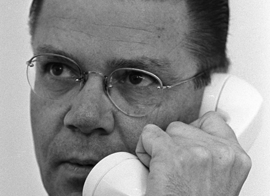Robert McNamara: An Appreciation
For students of organizational thinking, one of the last of the late modernist thinkers, and an important one, died this month. Naturally, most assessments of his life opened and closed with the geopolitics of the cold war, specifically on his instrumental role in the prosecution of the Vietnam War. This role is often referred to as that of an architect.1 In sum these observations are a full and honest account of his life's work, in which the orthodoxy--infrequently challenged--is that the Vietnam conflict was a lost cause, pursued mightily and at great loss of life.
I wish to touch on the deep connections between McNamara and organizational thinking. McNamara's work applying civilian oversight and robust operations research to the armed forces yields interesting object lessons. His perspective is certainly established by his work, coming out of the Harvard Business, to establish a similar rational revolution at Ford Motor Company. In that time, his invented management caste held an inviolable faith in data: the sourcing, transforming, and establishment of organizational containers. He accomplished similar changes in government. And these vectors of modernist thinking would be tested mightily when management theory collided with the bewilderingly complex "theater" of post-colonial Southeast Asia.2
What makes a study of McNamara so rewarding is his exposure at the elbow of modernism and post-modernism, terms I use only in their context at least as it relates to organizational thinking and perhaps information design. His testimony in Errol Morris' The Fog of War, an essentially uninterrupted two hour survey of his intellectual life that is at turns confessional and professorial. In particular, McNamara's focus on the role of empathy seems to me an acknowledgement of the irrationality present at the core of the human mind. His awareness of this conflict appears strongly in his writing following his public service.
To apply a man's life of controversy and the nihilogism of the Vietnam war to the running of organizations, or the transfer of knowledge or the design of information may appear flip. I run that risk in suggesting his success and failure therein have useful object lessons for a careful student.
Notes
1. The title may be particularly connected to Halberstam, but I'm not sure. It's an interesting choice for sure.
2. I believe an examination of McNamara's theater of thought as it relates to a continuum between perhaps Lévi-Strauss and Foucoult--at least their work on the formation of collective meaning and the roles and responsibilities of man--merits some academic attention.
Posted July 14, 2009.

